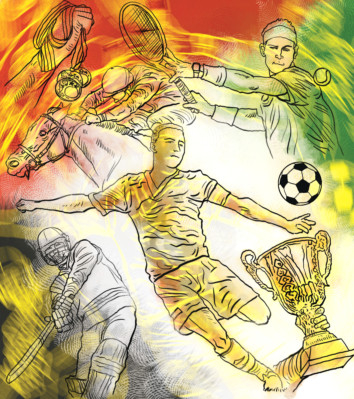
As I watched Sebastian Vettel, the Formula One world champion zoom by under the floodlights in the idyllic setting of Yas Marina track in Abu Dhabi earlier this month, my mind suddenly raced back five years ago. It was a media tour on a hot day in 2008, organised by the authorities to check out the progress of the Yas project.
What stood before my eyes was still a vast expanse of desert land, the buzz of construction activities still failing to convince the cynical eyes if the infrastructure, the hotels and the connecting highways to the heart of the capital will be ready on time. Well it did, much before deadline and Abu Dhabi announced its arrival as the latest Formula One stop in the world from 2009 — the only day-night race on its calendar.
The story of Yas is symptomatic of the vision that the UAE has shown during its evolution as a key player in the region — where, to quote from a famous adline —‘impossible is nothing.’ What’s of added significance to it is that the leadership of the country has believed in the power of sport as an useful tool for raising the profile of the country which in turn can give a fillip to its tourism and economy.
It’s been barely a decade that the Gulf region has actually woken up to the idea of embracing sport as a means of marketing your country, with Qatar’s winning the bid to host the Fifa World Cup in 2022 being the crowning glory. However, it will be no exaggeration to say that Dubai – and subsequently Abu Dhabi – had played a pioneering role much before in giving others the direction.
Even as the emirate collectively holds it’s breath for November 27 when the candidate city for Expo 2020 will be announced, a heartening piece of news came through from London earlier this month. The seventh International Sports Event Management (ISEM) awards ranked Dubai as the second best sporting city behind London. Auckland in New Zealand was nominated as the third choice.
It’s certainly a moment of pride to know that Dubai had edged out at least four distinguished cities, some of whom had hosted major international sporting showpieces, for the second position: Manchester, Sydney, Dusseldorf and Istanbul. The ISEM roll of honour shows that Dubai had actually improved from their third place finish last year.
A checklist of the array of major international sporting events that the UAE has on offer can be jaw-dropping: it hosts the richest horseracing meet in the world in the Dubai World Cup, four major European Tour golf events (including one for women), two weeks of top flight tennis, a Formula One Grand Prix and a hugely popular Sevens Rugby World Series event. Add to this a slew of international cricket fixtures, the occasional Fina swimming World Cups and the variety and volume of the portfolio looks a mindboggling one.
The vision of His Highness Shaikh Mohammad Bin Rashid Al Maktoum, Vice- President and Prime Minister of the UAE and Ruler of Dubai had been the driving force behind these events, which has set up the foundation for a world c lass sporting infra-structure — which will come handy in case Dubai revives it’s plans of bidding for the Olympics. Incidentally, the emirate had once conducted a feasibility study for bidding for both the Expo 2020 and the Summer Olympics but had opted for the former — a dream which looks close to reality today.
The Dubai Sports City, once fully completed, will be the cornerstone of the infra-structure while the Meydan race course enjoys a pride of place for its unique appeal. A state-of-the art venue for the Dubai World Cup, Meydan is virtually a ‘city’ unto itself — complete with a luxury hotel, Cineplex, golf course and residential complexes.
No less important in the sporting landscape are the top five to six golf courses which have, in their own way, contributed to the real estate boom in Dubai. The Emirates Golf Course and the Dubai Creek Golf & Yacht Club have been joined by the new signature courses, designed by legendary golfers like Greg Norman, Colin Montgomerie, Ernie Els and Nick Faldo —with the hotels and residential villas dotting them playing their part in wooing the investors and tourists alike.
There is more good news in store as Dubai will soon add another feather in its cap with the Tour of Dubai — a full scale cycling Tour event with its first edition scheduled next February. While details are still emerging, it’s set to be quite a spectacle with the route showcasing the major landmarks of Dubai like Burj Khalifa, Burj Al Arab during the telecast of the event.
Looking at the bigger picture, it’s clear that the proliferation of the sporting events or the infra-structure had not really been an isolated phenomenon for the UAE. Rather, it had always been a part of the road map for the nation’s development — an idea which some of the neighbours seem to be borrowing now.








